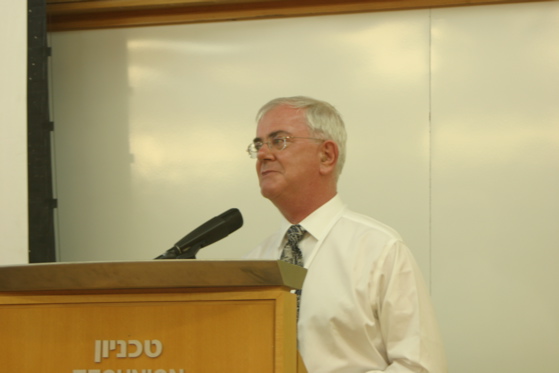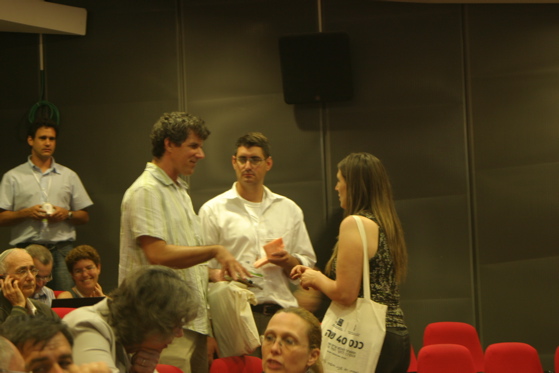 “How Do We Want to Live?” asks England’s Former Secretary-General of the Royal Town Planning Institute Robert Upton at an urban planning conference in Israel.
“How Do We Want to Live?” asks England’s Former Secretary-General of the Royal Town Planning Institute Robert Upton at an urban planning conference in Israel.
Whereas Colombian planner Oscar Diaz (who we interviewed here) was practical and sited specific planning examples at the anniversary conference at the Technion-Israel’s Institute of Technology, England’s planner Mr. Robert Upton’s speech was more philosophical. This seasoned response from the fourth Royal Town Planning Institute Secretary-General (and the only one to make it out alive, Upton jokes), asked of Israel’s planning audience to think reflectively about the challenges of their profession.
He began by recalling the history of England’s Royal Town Planning Institute, a relatively brief history that began in 1914. But he said that early on the profession became “cluttered” with “no shortage of bodies who claim to be specialists.” And the public was skeptical.
In a personal interview with Green Prophet he was careful to clarify that in the context of WWII, there was a tremendous need for England to rebuild itself and planners such as Thomas Sharp took on the challenge. Sharp later became “disillusioned” according to Upton, as the public became increasingly dissatisfied.
The profession also suffers from a sort of existential dilemma. It is never clear whether planners are designers or technical, whether the field falls under the parlay of social science, or if it is a hybrid.
Israelis such as architect Amos Brandeis and government planner Shamay Asif, who provided commentary after Upton’s presentation, also identified with this dilemma.
Another shared conflict in England and Israel is that between architects and planners. What role should design play in the planning process?
Architects believe that they should play an important role in the planning process, but planners think they are redundant. Upton says that it is important that planners “dont’ take the design out of the plan – design creates understanding.”
However, he also quoted English author Samuel Johnson, who said approximately that it isn’t necessary to know how to make a good chair in order to be able to recognize one. The fire rages on.
Upton summarized his discussion with the question “how do we want to live?” This is the question that all planning institutes should answer, for which Upton agreed with me that there is no blanket answer. The answer depends on the following variables: “what are our options? Our values? What are the facts? What are the rules? The power of relations? Who benefits, and who is not represented?” The answers will be different in every community.
Alexandra Frackelton from The Arava Institute raised the question of public participation. It was agreed that public participation in Israel is neglected, and that the process of encouraging it needs to be streamlined.
As a legal problem, it is currently being addressed. Meanwhile, going forward, Upton believes it is important to find a “shared ethic.”
While Mr. Upton’s presentation raised more questions than provided answers, John Simone believed that framing the right questions is the key to wisdom. Israeli planners are faced with a rapidly growing population, diminishing natural resources, and imminent climate change: their greatest challenge will be to find questions that will produce the best solutions for the greatest number of people.
More on Planning from The Middle East:
Jordanian Sustainable Building Conference
Ecoweek
Rawabi, the First Planned Palestinian City






I agree totally with most of the points raised by mr Upton. I would love to attend such conference in future. I am a final year student from africa studying town and country planning